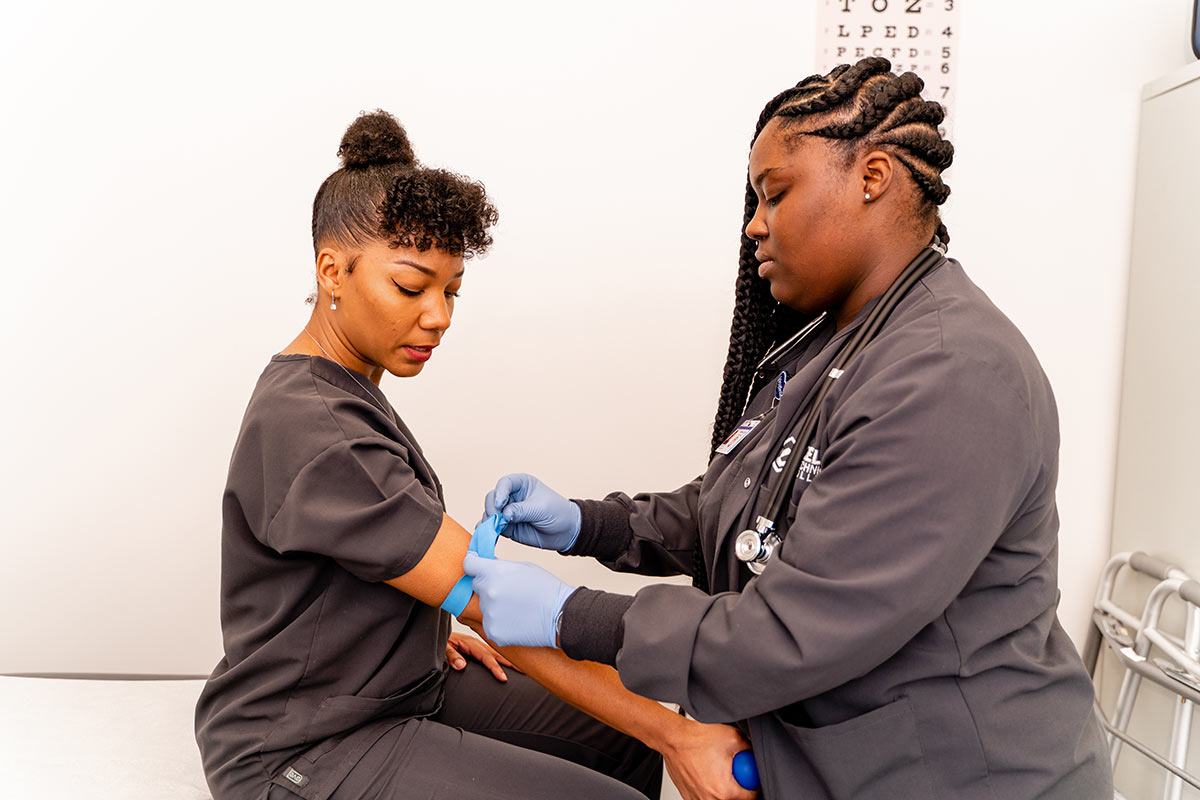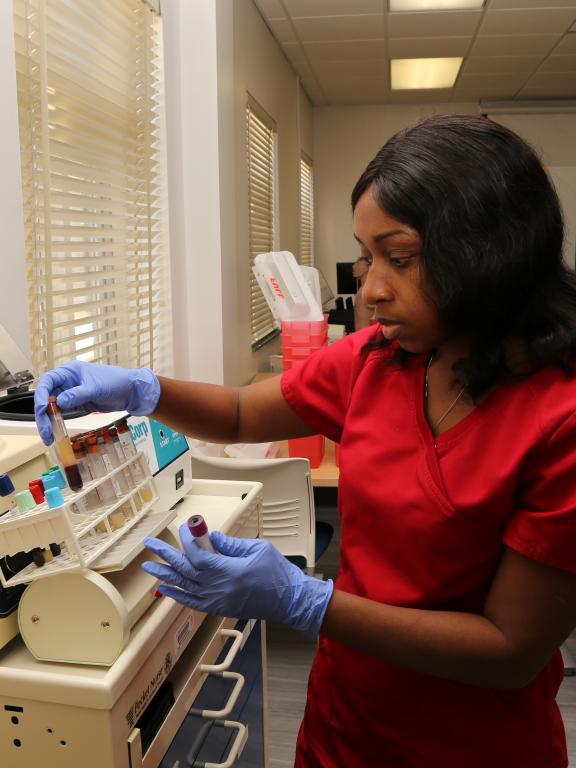The Path to Accreditation: Comprehending the Phlebotomy Educating Course Journey and Its Significance
As you think about the course to accreditation in phlebotomy, it is necessary to recognize the duty you'll play in healthcare. Your training will cover important skills, from blood collection techniques to patient communication. Each part of the program prepares you for the obstacles in advance. Yet just what does the journey involve, and why is accreditation so essential for your future profession? Allow's discover these concerns even more.

The Duty of Phlebotomists in Health Care
Phlebotomists play an important duty in the health care system, acting as the crucial link in between patients and necessary diagnostic screening. You'll perform blood attracts, ensuring samples are gathered properly and safely. Your expertise assists in detecting medical problems, monitoring health and wellness, and leading treatment decisions.
In your everyday communications, you'll need to establish trust fund with clients, making them really feel comfy throughout what may be a difficult experience. You are accountable for labeling and managing examples carefully to stop contamination or mistakes, which can affect test results.
Past this, you'll usually function along with medical professionals and registered nurses, connecting critical details concerning patients' conditions. By mastering your abilities, you add meaningfully to person treatment, making you a crucial component of the medical team.
Introduction of Phlebotomy Training Programs
When checking out phlebotomy training programs, you'll discover different kinds made to fit various routines and learning designs. Each program aids you establish necessary skills like blood collection and patient interaction. Comprehending these options is vital to picking the right course for your career.
Kinds Of Training Programs
Numerous kinds of training programs are offered for those aiming to come to be skilled in phlebotomy. You can select from certification programs, which generally last a few months and concentrate on vital skills. There are likewise diploma programs that offer an even more complete education, often lasting as much as a year. If you're searching for a much deeper understanding, an associate degree in a related field could be the ideal fit. On-line programs supply versatility for those stabilizing work or household commitments, enabling you to research at your own rate. Furthermore, some hospitals and centers offer on-the-job training programs, supplying practical experience while you discover. Whatever course you choose, each program intends to equip you with the required abilities for a successful phlebotomy profession.
Secret Skills Established
Grasping phlebotomy needs a collection of crucial abilities that are established with detailed training programs. You'll find out technological abilities like appropriate capillary choice, needle insertion, and blood collection methods. These hands-on methods guarantee you can carry out procedures securely and successfully. Additionally, communication skills are basic; you'll need to engage with clients, discuss procedures, and put them comfortable. Recognizing composition and physiology is vital, as well, as it helps you situate blood vessels and comprehend the body's reaction to blood draws. Ultimately, you'll get understanding of safety procedures and infection control, guaranteeing you maintain a clean and sterile atmosphere. Each of these skills is important for your success as a certified phlebotomist, making you a valuable possession in any medical care setup.
Key Elements of a Phlebotomy Course
In a phlebotomy program, you'll concentrate on vital subjects that lay the groundwork for your future profession. You'll involve in hands-on training that allows you to apply what you have actually learned in real-world settings. Both the curriculum and practical experience are crucial for your success as a phlebotomist.
Core Curriculum Summary
While going after a phlebotomy training program, you'll experience a curriculum designed to furnish you with essential abilities and knowledge. Phlebotomy Training Course. This curriculum normally consists of composition and physiology, concentrating on the blood circulation system and understanding blood components. You'll likewise find out about various kinds of blood collection approaches, consisting of venipuncture and capillary slit techniques
Additionally, infection control and safety methods are crucial parts, ensuring you know just how to keep a clean and sterile atmosphere. You'll examine patient interaction, stressing interaction and empathy, which are critical for reducing person stress and anxiety.
Hands-On Training Experience
Getting hands-on experience is a crucial component of your phlebotomy training course. This sensible training enables you to apply what you have actually discovered in a real-world setting, boosting your abilities and confidence. You'll exercise venipuncture strategies, find out exactly how to handle various types of samplings, and get acquainted with the devices used in the area. Under the assistance of knowledgeable instructors, you'll improve your skills, guaranteeing you're gotten ready for any scenario you might encounter.
Additionally, you'll obtain the chance to connect with clients, which is crucial for developing your communication abilities. This mix of technical efficiency and social abilities is crucial for your success as a licensed phlebotomist. Inevitably, hands-on training is where theory satisfies method, strengthening your knowledge and readiness for qualification.
Certification and Licensing Requirements
Before you can begin your job in phlebotomy, it is important to comprehend the qualification and licensing needs that vary by state. Most states require phlebotomists to hold an accreditation from an identified company, such as the National Phlebotomy Organization or the American Culture for Medical Pathology. These accreditations normally include passing a test that checks your expertise and abilities in the area.
Along with qualification, some states have certain licensing needs. You might need to finish a certain number of hours in scientific practice, send proof of training, or undertake a history check. It is vital to research your state's regulations to ensure you fulfill all essential standards.
Remaining notified about these requirements not just assists you protect a setting but also boosts your reliability as a professional. By fulfilling these needs, you'll be well on your means to a successful job in phlebotomy.
Hands-On Training and Practical Experience
Hands-on training and sensible experience are essential parts of your phlebotomy education and learning, as they allow you to apply academic understanding in real-world situations. Throughout your training, you'll involve in supervised venipuncture, find out appropriate methods, and become knowledgeable about various blood collection tools. This direct involvement is essential More Help for developing your confidence and sharpening your skills.
You'll function carefully with skilled professionals that can direct you via the nuances of patient communication and sample handling. Each method session not only strengthens your understanding but also prepares you for the hectic environment of health care settings.
Furthermore, many programs include scientific turnings, enabling you to experience varied settings, from medical facilities to outpatient centers. This exposure assists you adjust to different difficulties and patient requirements, guaranteeing you're well-prepared for your future role. Accept these possibilities, as they're important to becoming an experienced and compassionate phlebotomist.
Difficulties Encountered During Training
While getting hands-on experience is essential, it is necessary to identify the obstacles that can occur throughout your phlebotomy training. You could experience anxiousness when executing procedures on genuine individuals, specifically if you're brand-new to the environment. The pressure to get whatever right can be frustrating. Additionally, grasping the abilities needed for blood attracts takes technique; you might deal with technique at first.
Time management can also be a hurdle, as balancing theory, practical sessions, and personal commitments can feel daunting. You may encounter varying learning paces amongst your peers, causing feelings of insecurity if you think you're falling behind. Adapting to the different personalities of instructors can be challenging, as each may have an unique training design.
Identifying these obstacles at an early stage can try this web-site prepare you for success and help you create durability throughout your training journey.
Job Opportunities After Accreditation

As you get experience, you may even think about concentrating on locations like pediatric or senior citizen phlebotomy, catering to certain patient demands. Some phlebotomists choose to advance their occupations by becoming lab technicians or going after further education in health care areas.
In addition, your certification can lead to roles in training or overseeing brand-new phlebotomists, permitting you to share your expertise. With the health care market constantly expanding, your skills will constantly remain in demand, paving the way for a steady and meeting profession. Embrace the possibilities waiting on you!
Regularly Asked Questions
What Is the Normal Duration of a Phlebotomy Educating Training Course?
Phlebotomy training programs typically last around 4 to eight weeks. You'll participate in hands-on technique, class direction, and on the internet knowing. Completing this training prepares you for qualification and a satisfying career in medical care.
Are Online Phlebotomy Courses Available?
Yes, on the internet phlebotomy training courses are offered. They supply adaptability and ease, allowing you to research at your very own rate. Simply confirm the program is approved to fulfill certification demands and obtain beneficial skills for your profession.
Just How Much Does Phlebotomy Training Normally Cost?
Phlebotomy try here training typically sets you back between $700 and $2,500, relying on the program and place. You need to consider factors like training course size, included materials, and hands-on experience when picking the right training for you.
What Prevail Requirements for Phlebotomy Training?
Typical prerequisites for phlebotomy training often consist of a senior high school diploma or GED, immunizations, and a history check. Some programs might additionally call for standard healthcare understanding or qualifications, ensuring you're prepared for hands-on training.
Can I Function While Completing My Phlebotomy Training?
Yes, you can work while completing your phlebotomy training. Lots of trainees equilibrium work with their research studies, however ensure to handle your time effectively to ensure you satisfy both job and training commitments successfully.